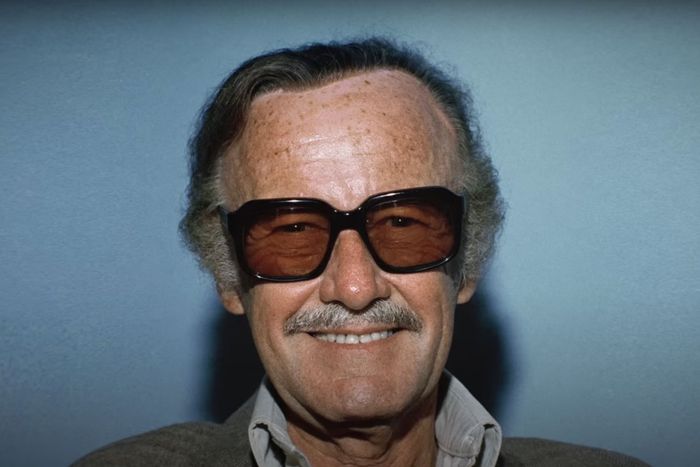
About a quarter of the way through the new Disney+ documentary about Marvel Comics legend Stan Lee, we hear old interview footage of him defining his artistic purpose. “I’ve started realizing,” he says, “to most people, the most important thing is being entertained — getting pleasure out of something.”
The bluntly titled Stan Lee, directed by David Gelb, certainly aims to please Lee’s most die-hard fans. It reinforces their sincerely held belief that the comics maven was the singular creative force behind the Marvel universe. It has nice things to say about the talents of onetime collaborators Jack Kirby and Steve Ditko, and it nods toward some spats between them and Lee. But it is, overall, a happy story about a charming guy born Stanley Martin Lieber who became a legend under a pen name, thanks to ingenuity and a positive attitude. The tale it tells (or, really, that Stan tells — the narration is almost entirely composed of interviews with him) is one of joy and inspiration.
It also happens to be entirely useless as objective history. Stan Lee, to put it simply, is just as fictional as the latest Spider-Man picture.
I have not come to do a fact-check or a takedown. I’ve already done that many, many times. I’ve used hard evidence to tell the fandom who he really was, from his remarkable virtues (relentless support of his wife and daughter, expert marketing, hepcat prose, warm fan interactions) to his endlessly fascinating complications (theft of artistic credit, abandonment of his birth family, explosive racism and homophobia, and millions of dollars in fraud, to name just a few). Critics raved about True Believer, my 2021 biography of Lee, which was built on more than 150 interviews and thousands of pages of personal documents, among other materials. Its conclusions were written about everywhere, from The New Yorker to Spain’s El País. I foolishly thought it might change the narrative about him.
This documentary is proof that I was wrong. The venerable and highly lucrative Stan Lee Myth is safe. For now, at least.
Stan Lee is, very literally, a trademarked brand. Disney, which has owned Marvel for nearly 15 years, has no interest in presenting a true story about him — it would be far too depressing. This documentary is entertainment content in the eyes of the execs, aimed at drawing and retaining streaming subscribers, and the simple math is that more folks would rather watch a happy story about Stan Lee than a sad one about Stanley Martin Lieber. Do you think you could convince Bob Iger or Kevin Feige that it would be wise to admit their empire is built on a foundation of deception and theft?
There has been something of a backlash to the film so far. Reviews have been negative, and Kirby’s son, Neal, released an open letter that memorably began, “The 13th-century Islamic poet/scholar Rumi said, ‘The Ego is a veil between humans and God,’” and then raged against the obvious lies in the film for three vicious pages. The tweet in which the letter was released was retweeted by more than 5,200 people. This kind of pressure is justified and necessary.
It also may be futile. We are not living in a rational or scientific age anymore. People want to believe in something, and belief is nearly impervious to correction. Marvel is the most successful pop-culture franchise in the world. Millions of people venerate the characters and recount their epic sagas the way we used to talk about the Exodus or the Gospels. The Marvel books with Stan’s name on them are held up as scripture — perhaps dated but of paramount importance. And every holy book needs a holy author, lest the whole enterprise fall apart under the weight of skepticism.
Showing a hard-core Marvel fan evidence that Stan Lee lied, cheated, and stole gets you about as far as you would get showing an Evangelical evidence that Christ never existed. They’ll either be furious with you or cheerfully ignore you, but they won’t believe you. For both the executive high priests and the ordinary worshippers of Marvelism, the gnostic gospel of Stanley Martin Lieber amounts to heresy. Only praise and affection are appropriate for their dead god.
This kind of hagiography is, of course, akin to many deeply troubling patterns in recent American politics, ones that hardly need to be listed. But it also does a disservice to Stan, in its way. By praising him to the high heavens and avoiding topics that might make a viewer uncomfortable, Stan Lee has no respect for its subject’s astounding and eminently human life.
Stan was a towering American original, and, at the end of his nearly 96 years on earth, he was the victim of horrific elder abuse. Disney didn’t appear to lift a finger to stop those who were tormenting Stan while he was alive, and this new documentary lets his abusers off the hook by deleting them and their actions from Stan’s life. But the fans who purport to love him the most are the ones least likely to even want to learn, let alone care, about his suffering.
“It seems to me that you enjoy things you’re familiar with,” Stan muses at one point in the documentary. Indeed. Right now, the Stan Lee Myth is intact because we’re familiar with it. But I hold out hope that, many centuries from now, it won’t be so familiar. His original fans, the boomers, are dying off, and we will all follow suit one day. Stan will no longer be a living memory, a familiar face, a fatherly influence. He already is myth, but he will someday be ancient history.
Perhaps that will mean objective looks at his electrifying and ethically questionable existence. Maybe those people of the future will analyze how Stan fooled the world and what that says about this anxious age. Maybe people will learn to stop venerating fallible humans as magnanimous gods. We can only pray.




